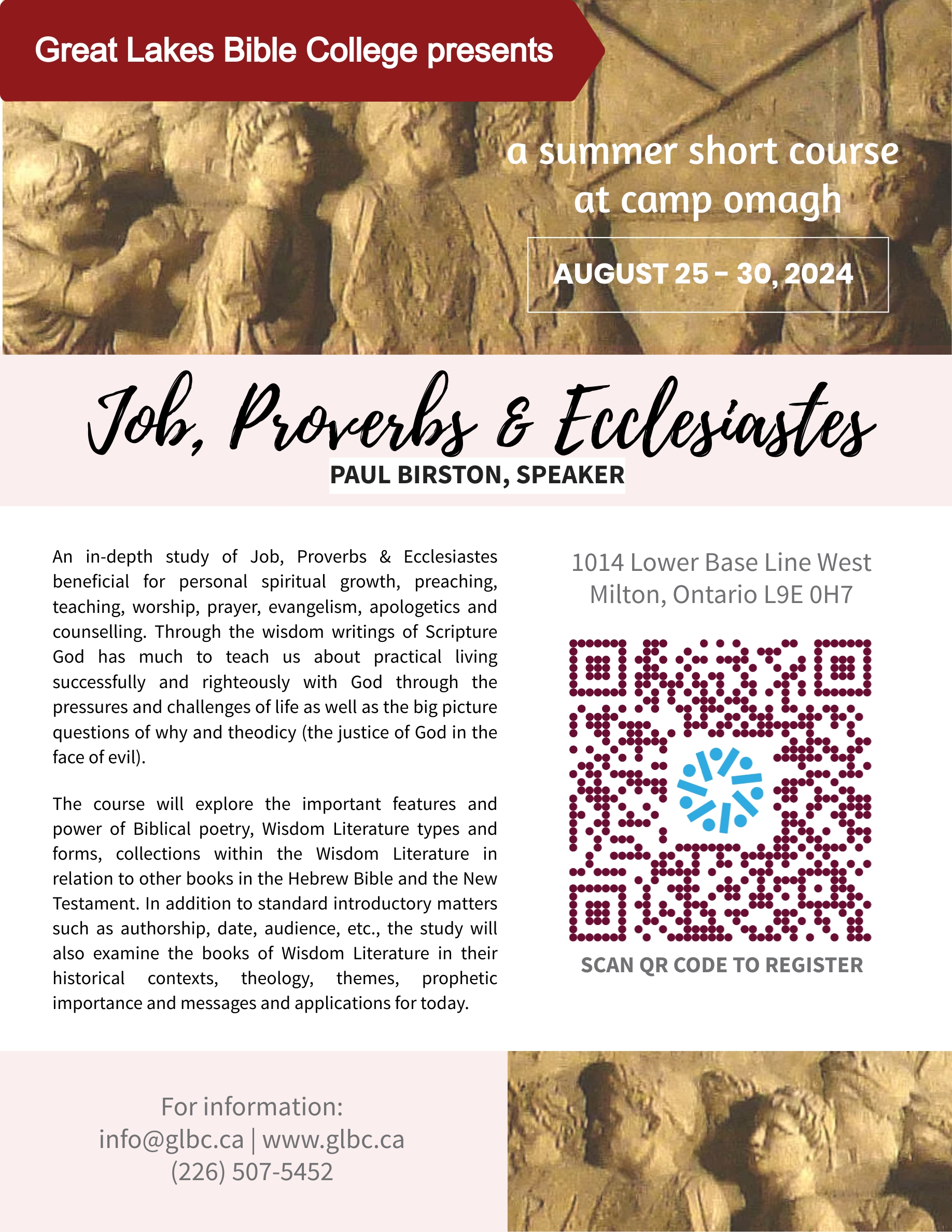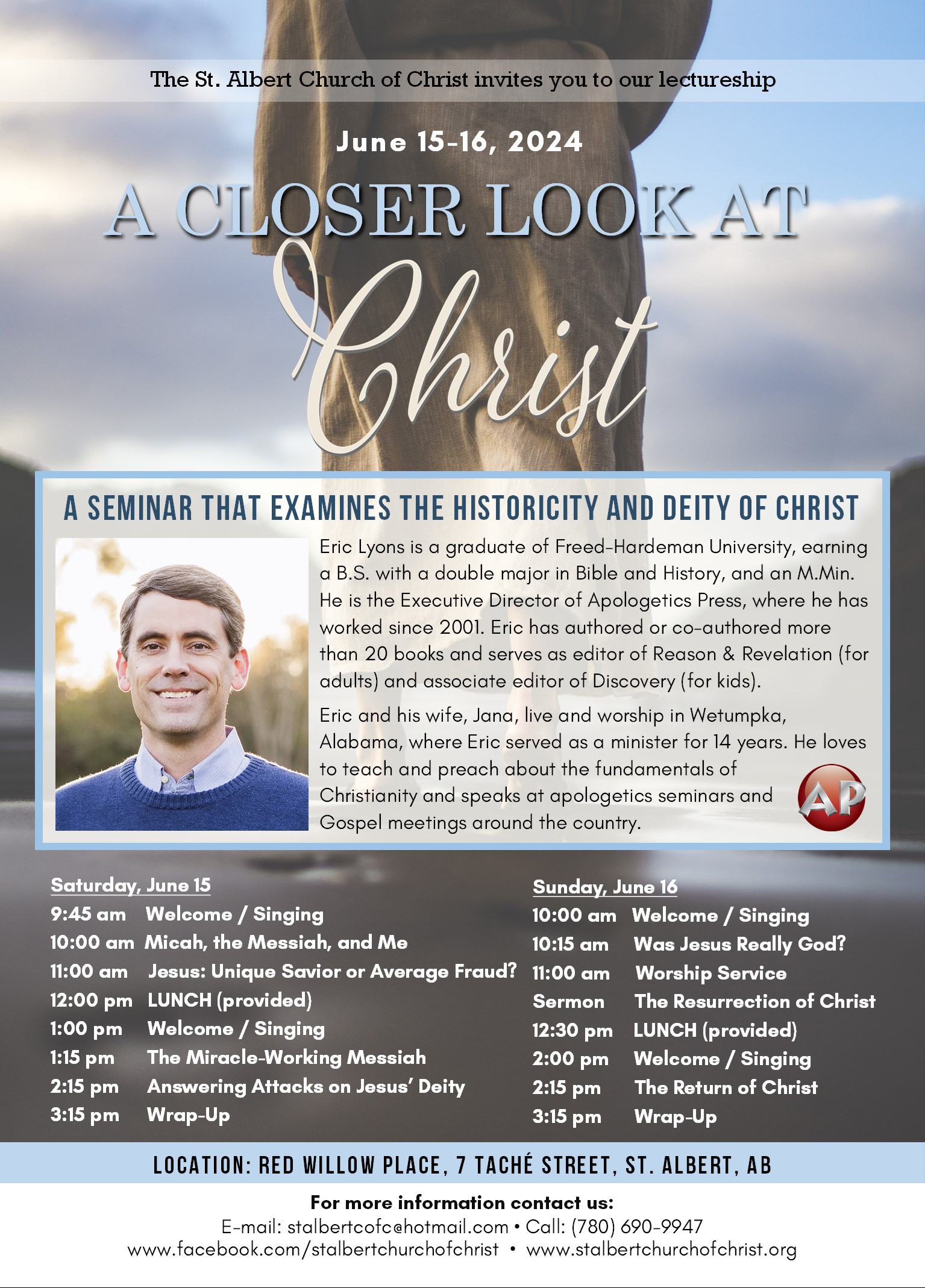Text: Acts 2:29-41
The question is: “what must I do to be saved from sin?” The more personal form of the question for those professing to be save is: “what did I do to become a Christian?” Unless you and I have a Biblical answer to this question, then we do not know whether or not we are saved.
Let us begin with a couple of observations:













- The first is that this is the most Important question addressed by the New Testament. If we can’t find the answer, then we cannot be saved.
- The second observation is that no subject is more thoroughly taught both as a command or answered by example in the New Testament than this one.
I read recently that there are 269 chapters in the New Testament…I had never counted them before…and in them baptism is mentioned over 100 times. The role of baptism in salvation is therefore not based on just a few obscure passages.
To those two observations I would challenge each of us…to be consistent.
If I believe that baptism is necessary for salvation from sin, then I must take my stand on that…and do it from scripture. If you are convinced otherwise, then take your stand on that…but we must always do so from scripture.
Whatever conviction you hold, you have an obligation to base your salvation on it.You have an obligation to profess it…to teach it and to share it. What there is no room for is to remain undecided or uncommitted. Nor is there room for inconsistency.
Having spoken definitively, the Bible leaves no room for me to say: “I became a Christian this way but you can become a Christian in your own way”. If you know that I am wrong and am not a Christian, then you have an obligation to speak to me about it.
I am always surprised when someone says, that we can’t answer this question from scripture. That somehow scriptures addressing this matter are unclear or indecisive.
Thankfully, that’s just not the case. There is no subject dealt with more thoroughly or with greater clarity than this. There is no question answered more often, demonstrated more fully or laid to rest with greater certainty.
The answer is anticipated in the Great Commission where Jesus said to his apostles: “Go therefore and make disciples of all the nations, baptising them into the name of the Father, the Son and the Holy Spirit, teaching them to observe all that I have commanded you, and lo I am with you always, even to the end of the age” Matt. 28:19-20
“Go into all the world and preach the gospel to all creation. He who has believed and has been baptised shall be saved; but he who has disbelieved shall be condemned” (Mark 16:1-16)
Imagine Jesus saying to his disciples – “Go into all the world and preach the gospel to all creation”. When your audience asks what they must do in order to be saved, tell them that you simply do not know.
Our lord’s words are not hard to understand. “He who has believed and been baptised (ie. In the name of the Father, Son & Holy Spirit) shall be saved. Then, perhaps to add further clarity, Jesus went on to say ‘he who has disbelieved shall be condemned’. The assumption is that an unbeliever would not be baptised and that if he did it would do no good. It would be redundant to say…he who has not believed and who has not been baptised’.
Luke describes the setting for the great commission this way: …”then he opened their minds to understand the scriptures, and He said to them, ‘Thus it is written, that the Christ should suffer and rise again from the dead the third day; and that repentance for forgiveness of sins should be proclaimed in His name to all nations, beginning from Jerusalem. Luke 24:45-47
Notice the parts of this commission. The great commission calls men and women to believe and be baptised unto salvation (Matt. 28, Mark 16:) It also calls them to repent for the forgiveness of sin. (Luke 24). This is the same commission…the same mission – from the same Lord. Thus, even before we read the history of the the founding of the church, we have a pretty good idea what we will find.
Acts chapter two tells the story of the Gospel being preached for the first time in Jerusalem and then from there, to the whole world. The Apostles began to carry out the great commission on the Day of Pentecost. Let’s recap what happened on that day.
Luke tells us that the Jews who assembled on the day of Pentecost were ‘devout men from every nation under heaven’. These were God-fearing people, neither not atheists nor idolaters. They already believed in Yahweh. They believed that the scriptures were the inspired word of God and they fully believed in the prophecies and promises of God. There was no need for Peter to convince them of this.
As believers in God there is still one thing lacking in their faith. They did not yet believe in Jesus of Nazareth as the Son of God. As we will see, they needed to add faith in Jesus to the faith that they already had in God the Father.
Drawn to the Temple courts by what sounded like a great rushing wind, they heard a group of Galileans speaking to them in about 16 different languages or dialects. Peter’s sermon on that day brought them to faith in Jesus. They came to understand that these signs fulfilled Joel’s prophecy in chapter 2 of his book.
They also came to believe that Jesus had risen from the grave as foretold by the prophet David. And the miraculous signs on that day served as evidence to them that Christ was ruling in heaven and had poured out his Holy Spirit.
Luke tells us that they were cut to the heart when Peter drew this conclusion: Therefore let all the house of Israel know for certain that God has made Him both Lord and Christ – this Jesus whom you crucified.’ The question that they raised is our question. Cut to the heart means that they were fully convinced and convicted. They stood before Peter and before God as believers in Jesus of Nazareth.
This new content to their faith was both wonderful and fearful. It was wonderful …that God had sent his messiah, yet fearful…because they had nailed him to the cross. So they asked the most important question that they could. ‘Brethren, what shall we do?” In other words…what shall we do to be saved? We admit our guilt and we don’t know what to do.
Peter’s answer is the key: What he did not say is just as important as what he did.
He did not say:
- Believe in Jesus as the Son of God. The fact that they had been cut to the heart was proof that they did believe. They now knew that they had killed God’s son, and their messiah. They would not have asked the question if they did not believe.
- But in light of the fact that they were now believers in Jesus, it is also important to notice that Peter also did not say: ‘do nothing, your faith has saved you’.
Had Peter been preaching a modern day version of salvation by ‘faith alone’, this was his cue. Peter would then have said something like: “please don’t even think about doing anything, because that would be salvation by works which is a huge mistake!
Instead, this is what he did say”. “Repent and be baptized every one of you in the name of Jesus Christ for the forgiveness of your sins and you will receive the gift of the Holy Spirit. Vs. 38
In other words, there is something that you still need to do.
- By itself, faith in God is not enough. As devout Jews they already believed that.
- By itself, faith in Jesus as the Crucified, risen and enthroned Son of God is not enough.
- Nor is it enough to feel guilty about what you have done…this is not repentance.
There remains a command with a purpose and then a promise. The command is: repent & be baptised in the name of Jesus Christ The reason / purpose: is in order to have your sins forgiven. The promise is: you will receive the gift of the Holy Spirit.
There were two things that they were commanded to do and there are two things that God would do. They were to repent and to be immersed in the name of Jesus. God in turn would then forgive their sins and cause his Spirit to dwell within them.
Now there are two and only two ways to interpret Acts 2:38. Let’s look for a moment at the phrase ‘repent and be baptised for the forgiveness of sins. There is quite a bit riding on the meaning of the Greek preposition ‘eis’. This word can be understood and translated in one of two ways. The usual meaning is to render it ‘for’, ‘unto’ or ‘in order to‘,. But some claim that in this passage it means ‘because of’.
Let’s think about this second possibility – first.
- If ‘eis’ means because of – then Peter is saying that one must repent and be baptised because your sins are already forgiven.
- To put it another way, ‘you are already saved’ before and without repentance and baptism. You do them because you are a Christian, and not in order to become a Christian.
- So repentance and baptism give evidence that you are a Christian, but they do not play a role in making you a Christian.
The second way of translating the word ‘for’ is to reflect the purpose that it seeks to accomplish. Thus one repents and is baptized unto or for the purpose of receiving forgiveness of sins. Repentance and baptism then both play a vital role. Without them, we are not forgiven and do not receive the gift of the Holy Spirit.
In the first instance, repentance and baptism come after one is saved and are done because one is already saved. In the second instance, they are done before salvation and in order to be saved.
Before we look at these two possibilities there are three things that I would like to point out.
1. Both cannot be true at the same time. One is correct and leads to salvation. The other is not right and cannot save anyone. There is only one Biblical answer to the question…’what must I do to be saved?’
2. Regardless of which side of salvation – repentance and baptism belong to, both must be obeyed before one receives the gift of the Holy Spirit. The conjunction ‘and’, between repent and be baptized joins these two actions so that they cannot be separated. They go together and stand together. Whatever you say about one, you must also say about the other.
In other words, you cannot claim that repentance comes before salvation and baptism after. Or that baptism comes first and repentance afterwards. Either you repent and are baptised in the name of Jesus before you are saved and in order to have your sins forgiven. Or, you repent and are baptised after you are saved and you do them because you are already saved…because your sins are already forgiven.
IN EITHER CASE, REPENTANCE AND BAPTISM STAY TOGETHER. The doctrine of salvation by Faith Alone’ cannot be true if repentance and baptism stay together. Great effort is made to split them up. This doctrine tries to make repentance instrumental (it saves you) but baptism is evidential (it just gives external expression to something that has already happened spiritually or out of sight). It insists on repentance before salvation as a condition for the forgiveness of sins. But it also insists that baptism must come after salvation and is done because a person is already forgiven. Now this little word Greek word ‘eis’ cannot at the same time and in the same place – have two quite opposite meanings. But it must have two opposite meanings if ‘salvation by faith alone’ is true.
Whatever the word eis means, it applies in the same way to both repentance and baptism. Either you repent and are baptised because your sins are already forgiven or you repent and are baptised in order to have your sins forgiven.
Let’s consider these two options.: A Doctrine Examined:
Now very often the best way to examine a doctrine is to ask yourself: what does it imply? If it is true, then what else must be true also?
Let’s start with the idea that people are saved by faith alone and that repentance and baptism come after you are already saved. What would that involve?
1. Well, first of all, repentance would then be non-essential to your salvation. You could be – an unrepentant Christian. In fact, as a Christian, you would never have to repent of your sins at all. So, if you die without ever repenting, you will still go to heaven. If repentance comes after Salvation, it is not therefore a condition of salvation. Thus, a person who has never turned away from sin and toward God is still a Christian. If in fact you are an ‘unrepentant Christian’, then it turns out that God has saved you against your will. By definition, a person who has not repented of sin does not want to do God’s will.
2. Baptism is then also non-essential. Like repentance, it follows salvation. You do it because you are saved and not in order to be saved. As a Christian, saved by faith alone, you should be baptised because God commanded it. But if you live your life as an un-baptised Christian and die that way, you will still go to heaven.
3. Now we noticed earlier, that the gift of the Holy Spirit is promised to those who repent and who are baptised in the name of Jesus.
In this test case, we have a person who is a Christian, saved by faith alone before and without repentance or baptism. That means that this person has not received the Gift of the Holy Spirit.
This person then is a Christian upon which God has not set his seal nor made any claim of ownership. He is saved by faith alone and without anything else is going to heaven. He is un-baptised but forgiven of sins. He does not have to repent of any of his sins but is still saved. He is not in-dwelt by the Spirit of God but somehow belongs to Jesus.
Now let’s remember that the men who asked that question on the day of Pentecost had already become believers in Jesus…they believed that Jesus of Nazareth was the Son of God.
If faith alone could save them then faith alone had already saved them. Peter’s answer skips right over the essential part of the gospel and commands them to do the non-essential stuff. A colossal blunder…if indeed that is what he did. Didn’t Peter know that they could get around to repentance and baptism later on? Didn’t he know that these new Christians could actually put off both of these indefinitely?
Doesn’t it make more sense instead, that Peter got it right? That in the matter of repentance and baptism for the forgiveness of sin, time was of the essence?
To sum up – with respect to this first interpretation: it is not evident in the literary structure or in the language of Acts 2:38. It implies doctrines that really no one within Christendom is willing to accept because they are obviously false.
Let’s come back to our text and let the Bible speak for itself. As we do, let me make a very clear and unequivocal statement. There are three things that you will not find in the Bible.
You will not find:
- A Christian who has never repented of his/her sin.
- A Christian who has had his/her sins forgiven without being baptised in the name of Jesus for the forgiveness of sins.
- A Christian indwelt by the Holy Spirit who has never repented of sin and been baptised into Jesus for the forgiveness of sin.
Let’s start again with Repentance.
Does it come before or after salvation? Does it contribute to your salvation or does it just evidence that you’re saved? Do you repent in order to be saved or because you are saved?
In Peter’s second recorded sermon he renews his call for repentance. He said “Repent therefore and return, that your sins may be wiped away, in order that times of refreshing may come from the presence of the Lord” Acts 3:19
“For you first, God raised up His servant, and sent Him to bless you by turning every one of you from your wicked ways’ Acts 3:26
Repentance was clearly to take place so that your sins may be wiped away. (for the purpose of). The removal of your sins takes place after repentance. Unless you repent, you will not be forgiven. Repentance therefore plays a role in salvation.
Both here and in Acts 2:38 repentance comes first and forgiveness comes later.
If repentance comes after you are saved, then there is such a thing as a Christian who has never been forgiven. A person ‘In Christ’ but never forgiven. That is a Biblical contradiction of terms.
Writing to the church at Rome in Romans 2:5 Paul said: “but because of your stubbornness and unrepentant heart you are storing up wrath for yourself in the day of wrath and revelation of the righteous judgement of God”
It was Jesus who said: “unless you repent, you will all likewise perish’. (Lk 13:3)
Repentance is not an optional extra. It comes before forgiveness. It is one condition upon which forgiveness is granted.
The same is true of Baptism. Repentance and baptism are both described as ‘unto’ or ‘for’ the forgiveness of sin. If repentance comes before salvation and is a condition of it, then so is baptism.
Peter’s second sermon in Acts 3:19 insists on repentance so that sin may be forgiven. Therefore we are also baptised so that our sin may be forgiven.
In one of his articles, Dr. Richard Oster cited 4 other places in the New Testament where the Greek prepositional phrase (eis aphesin harmartion) is used. In English translations, we find it translated as ‘for the forgiveness of sins’. It is fair to ask, with what meaning was it used.
The passages are:
In Matthew 26:28 we read that Jesus’ blood was to be shed for the forgivness of sins (eis aphesin harmartion). Was the blood of Jesus shed because the sins of the world were already forgiven? Or was it shed in order for the sins of humanity to be forgiven?
In Mark 1:4 and in Luke 3:3 we read that John the Baptist preached a baptism of repentance for the forgiveness of sins (same phrase – eis aphesin harmartion).
Did John the Baptist urge the Jewish people to repent and to be baptised because their sins were already forgiven? Would this not also imply that forgiveness preceded repentance (cf. Luke 13:5)? Or did he command this in order for their sins to be forgiven?
We find the phrase again in Luke 24:47 in Luke’s account of the Great Commission. There the Lord explained that repentance is to be preached to the Gentiles in his name ‘for the forgiveness of sins’ (eis aphesin harmartion). Did Jesus send his apostles into the Gentile world to announce that they were already saved? Or were they send so that the whole world might have the opportunity of being saved?
In each of these passages, where we find a parallel use of the phrase found in Acts 2:38, the only meaning that makes sense and does not contradict the rest of the New Testament is – that repentance and baptism are for the purpose of accomplishing salvation. They are integral to it and form part of the conditions upon which we accept the free gift of salvation in Christ.
The conversion of Saul of Tarsus is a good example of what Peter intended. It is recorded three times in the book of Acts. I have chosen it for several reasons.:
First of all, Paul became one of Jesus’ apostles. He was responsible for establishing congregations on two continents. By the end of his ministry he had authored almost half of the New Testament.
It is in his writings that most theologians claim to find the doctrine of Salvation by Faith Alone” So – let’s ask the question. “how was Paul saved?” How did Paul understand his own conversion?
Like the audience on Pentecost, Paul was a believer in God.
- He was on his way to Damascus to arrest Christians when he was confronted by Jesus.
- The vision that he saw and the message he heard led him to believe in Jesus as the son of God. Years later as he stood before king Agrippa and told this story, he said ‘consequently King Agrippa, I was not disobedient to the heavenly vision’. In other words, Paul did what he was told to do He went into Damascus and waited for further instructions.
While waiting, he fasted and prayed for three days and nights. Finally, Jesus sent a Christian named Ananias to him. Ananias said to Paul. “And now, why do you delay; arise and be baptised and wash away your sins, calling on His name”.
Now Paul had already come to faith in Jesus…but was still in his sins. He had already repented…he fasted and prayed…but he was still in his sins. His sins were not forgiven until Paul was baptised into Christ. As Ananias put it: “his sins still needed to be washed away”
After more than 25 years as a Christian and as an Apostle, this is Paul’s own account of how he became a Christian. Baptism for the removal of sin in Acts chapter 22:16 agrees with baptism for the removal of sin in Acts chapter 2:38
In the N.T. there is no such thing as an un-baptised Christian. Paul’s conversion was exactly the same as that of everyone else. This is consistent with the rest of Paul’s writings; consider the following.
In answer to the question: at what point and in what way does a person die to sin? Paul says: “how shall we who died to sin still live in it? Or do you not know that all of us who have been baptised into Christ Jesus have been baptised into his death? (Rom.6:2-3,
“…knowing this, that our old self was crucified with him, that our body of sin might be done away with, that we should no longer be slaves to sin for he who has died is freed from sin” (Romans 6: 6-7
Writing to the churches in Galatia, Paul said: “For you are all sons of God through faith in Christ Jesus. For as many as have been baptised into Christ have clothed yourselves with Christ”. (Gal.3:26-27)
These two verses teach that both faith and baptism are necessary for Salvation. Those who have clothed themselves with Christ are those who have been baptised into Him. Those who have not clothed themselves with Christ have not been baptised into Him. To be clothed with Christ is to be saved. To be unclothed is to remain outside of Christ and alienated from Him…still in sin and un-forgiven. It is difficult to imagine how Paul could have expressed the necessity of baptism more clearly.
Many years after the day of Pentecost, Peter wrote a series of letters to the churches in the northern provinces of Asia Minor. 1st Peter 3: 18-22 draw a parallel between two things. God used water to separate the believing and unbelieving world in the days of Noah. And Water now separates the believer from the unbeliever, the saved from the unsaved.
Peter wrote:
“…when the patience of God kept waiting in the days of Noah, during the construction of the ark, in which a few, that is, eight persons were brought safely through the water. And corresponding to that, baptism now saves you – not the removal of dirt from the flesh, but an appeal to God for a good conscience – through the resurrection of Jesus Christ…”
Peter still believed that baptism saves us. It is an appeal to God for a good conscience, one cleansed of sin. It is an appeal based on the death, burial, resurrection, ascension and enthronement of Jesus.
This is exactly what Paul said….We are buried with Christ…baptised into his death and raised to walk in newness of life and to participate in a resurrection to eternal life. Rom 6 & 8
Toward the end of his ministry, Peter wrote: baptism now saves you. He had not changed his message from Pentecost until then. Since Acts 2:38 promises the indwelling of the Holy Spirit, let’s turn attention to this.
According to Peter, two things come after repentance and baptism.
- God forgives our sins.
- And he causes his Holy Spirit to dwell in us.
What is very clear is this:
The Spirit of Christ is only given to those who are in Christ.
And the gift of the Holy Spirit is only given after you have been forgiven.
Just a few verses after Paul says; ‘For you are all sons of God through faith, for as many as have been baptised into Christ have clothed yourselves with Christ’, he went on to say “and because you are sons, God has sent forth the Spirit of His Son into our hearts crying ‘Abba! Father!” (Gal.4:6)
The Spirit of Christ is given only to those who are Sons of God. He is given only after repentance and baptism in the name of Jesus for the forgiveness of sins. He is given only to those who have clothed themselves with Christ.
Paul explains the importance of this in Romans 8: 9b, 11
“But if anyone does not have the spirit of Christ, he does not belong to Him”
But if the Spirit of Him who raised Jesus from the dead dwells in you, He who raised Christ Jesus from the dead will also give life to your mortal bodies through His Spirit who dwells in you”
Speaking of Baptism in Romans 6:5 Paul said “For if we have been united with Him in the likeness of his death, certainly we shall be also in the likeness of His resurrection…”
Baptism is necessary for us to participate in His resurrection. The indwelling of the Holy Spirit is necessary for us to be raised to eternal life. It is very easy to see that Baptism and the indwelling of the Holy Spirit are inseparable and are necessary.
So…what must I do to be saved?
Peter answered that question on the day that God kingdom came to this earth. This was his answer to those who believed in Jesus as the son of God and were openly confessing that fact by their appeal for help. The answer was and still is: Repent and be baptised for the forgiveness of your sins and you will receive the gift of the Holy Spirit.
Barrie ON
